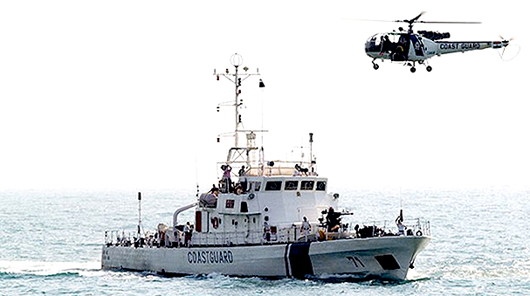Ahmedabad, Apr 21: A suspicious boat carrying narcotics worth around Rs 600 crore was seized and eight Pakistani nationals onboard were apprehended from international waters off Gujarat coast, in a joint operation by the Indian Navy and the Coast Guard.

"In a closely coordinated operation undertaken by the Indian Navy and Indian Coast Guard, a boat carrying a large quantity of narcotics was apprehended in international waters, off the coast of Gujarat yesterday. The operation also resulted in apprehension of eight Pakistani nationals manning the boat," a statement from the Defence Ministry today said.
"The boat was intercepted and apprehended by Indian Coast Guard ship 'Sangram' yesterday, whilst Indian Navy ship 'Kondul' provided support to the entire operation. The initial investigations have led to the recovery of 232 packets of narcotics (suspected to be heroin and worth up to Rs 600 crore in the international markets)," it said.
Satellite communication phones and Global Positioning Systems (GPS), which were being used to facilitate transshipment of the contraband to another boat, were also confiscated, it said.
The operation was launched on April 18 after receiving intelligence inputs. It was conducted in close coordination of the western command of Indian Navy along with north-west regional headquarters of the Indian Coast Guard, it said.
Multiple units from the Navy and the Coast Guard were deployed for the operation, which included Indian Naval ships 'Nirghat' and 'Kondul', along with Coast Guard ship 'Sangram', according to the statement.
The operation to nab the suspected boat was augmented by extensive aerial searches undertaken by Naval and Coast Guard aircraft, including Dorniers, IL38 and P8Is, it said.
All the persons apprehended in the operation are likely to be interrogated jointly by the Intelligence Bureau, Indian Coast Guard and the Navy.





Comments
Add new comment